The cultural situation in which we find ourselves is rich and complex. On the one hand, the experience gained during the intense 20th century has led man to think again about the meaning of his existence. On the other hand, scientific and technological advances have reached unsuspected development and dimensions. While contemporary science demands ever greater specialization, a deep understanding of reality invites to find ways toward the integration of a currently fragmented knowledge. Many of the big questions that have always been present in philosophical and theological reflection today are also addressed by contemporary science from new perspectives. But how is it possible to complement scientific and philosophical knowledge? Listening to specialists from various disciplines, this collection aims to find answers to this question.
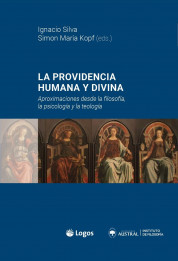 La providencia humana y divina. Aproximaciones desde la filosofía, la psicología y la teología
La providencia humana y divina. Aproximaciones desde la filosofía, la psicología y la teologíaIgnacio Silva - Simon Maria Kopf (editores), Logos - Universidad Austral, 2020.
El tema de la providencia divina es uno de los más acuciantes problemas en teología analítica y en filosofía de la religión hoy en día, en particular de cara a la evidencia científica de un mundo natural repleto de indeterminismo y contingencia, por ejemplo, en el mundo cuántico, en ciertos modelos cosmológicos del origen del universo, y la biología evolutiva. De acuerdo al teísmo clásico, Dios gobierna la historia del mundo natural y de la humanidad con conocimiento perfecto de los eventos futuros. Pero Dios también permite a las creaturas tener comportamientos contingentes no-deterministas. Considerando la providencia humana, este volumen busca catalizar un cambio de paradigma respecto de esta cuestión, aplicando nuevas metáforas para comprender y explicar las relaciones entre la providencia divina y el obrar de la creatura.
IGNACIO SILVA es investigador del Instituto de Filosofía de la Universidad Austral, Argentina. Anteriormente, se ha desempeñado como investigador del Ian Ramsey Centre for Science and Religion de la Universidad de Oxford. Tiene títulos de filosofía y teología por las Universidades Católica Argentina y de Oxford respectivamente.
SIMON MARIA KOPF es profesor visitante del International Theological Institute en Trumau, Austria, donde enseña Teología Fundamental, y es Doctor en Teología por la Universidad de Oxford, habiendo obtenido títulos en filosofía y ciencia y religión en las Universidades de Innsbruck y de Edimburgo respectivamente, en los que estudió temas de providencia divina y contingencia natural.
Disponible en Ediciones Logos.
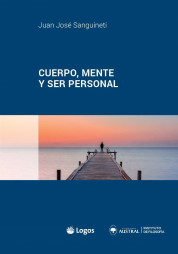 Cuerpo, mente y ser personal
Cuerpo, mente y ser personalJuan José Sanguineti, Logos - Universidad Austral, 2019.
El dinamismo de la persona humana responde a dos vertientes, entre las cuales puede haber tensión, pero sobre todo cooperación e integración. La primera vertiente es la espiritual y consiste en la tendencia a la verdad y al bien universales, cuya manifestación y cumplimiento últimos no se alcanza en la experiencia del mundo. La segunda responde a la encarnación en un cuerpo, que posibilita y condiciona a la vez las dimensiones psíquica, social y cultural de la vida de cada ser humano. Cada vertiente quedaría abstracta si se la tomara por separado. La concreción de la vida personal implica atender a ambas en su mutua imbricación. Ni un espiritualismo desencarnado ni un reduccionismo biológico, psicológico o cultural harían plena justicia a la realidad vital y existencial del ser humano.
Available at Ediciones Logos.
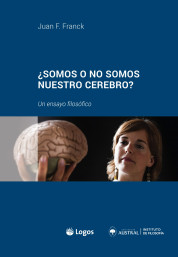 ¿Somos o no somos nuestro cerebro? Un ensayo filosófico
¿Somos o no somos nuestro cerebro? Un ensayo filosóficoJuan F. Franck, Logos - Universidad Austral, 2018.
According to a widely spread conception, we are a toy of unconscious brain mechanisms, and what happens within our brains determines the whole of our experience and of our behavior. We should ask ourselves, however, if this is really so. Do we lack any control over our thought, our intentions and our behavior? The book is a philosophical contribution about the many findings in the field of neuroscience. The brain is certainly a fundamental organ in the life of the human being, but it does not constitute the whole of the person.
JUAN F. FRANCK is PhD in Philosophy from the Internationale Akademie für Philosophie (Liechtenstein) and has pursued postdoctoral studies in Switzerland, Italy and Spain. He is a researcher at the Philosophy Institute of Universidad Austral and teaches Modern Philosophy at Universidad del Norte Santo Tomás de Aquino. His present area of concentration is the philosophy of the neurosciences.
Available at Ediciones Logos.
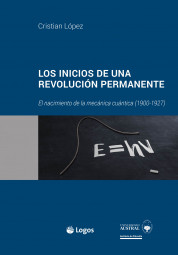 Los inicios de una revolución permanente. El nacimiento de la mecánica cuántica (1900-1927)
Los inicios de una revolución permanente. El nacimiento de la mecánica cuántica (1900-1927)Cristian López, Logos - Universidad Austral, 2018.
Quantum mechanics is one of the greatest intellectual projects in the history of mankind, not only for its many practical and technological applications, but also for forcing us to revise many of our scientific and philosophical preconceptions about what the world is like. Quantum mechanics is the product of a slow and progressive scientific revolution. A permanent one. Plagued with small twists and turns, guided and motivated by tensions that have gone through the history of classical physics since its birth, today we are still writing its history.
The present book analyzes and describes the first three decades of this permanent revolution in physics (1900-1927), during which two different generations of physicists and philosophers jointly focused all their efforts, and their intellectual, and even emotional potential to develop not just a new way of understanding reality, but of asking different questions about it.
CRISTIAN LÓPEZ is a PhD student at the University of Buenos Aires and the University of Lausanne (Switzerland), and a doctoral fellow at CONICET. He has participated in numerous national and international scientific events, he has co-edited two books at Cambridge University Press and has published articles in specialized international journals. He was Academic Visitor at the MCMP-LMU (Germany), Oxford University (UK), University of Lausanne (Switzerland) and University of Geneva (Switzerland).
Available at Ediciones Logos.
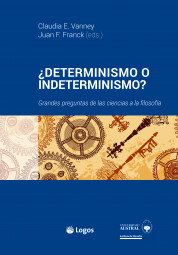 ¿Determinismo o indeterminismo? Grandes preguntas de las ciencias a la filosofía
¿Determinismo o indeterminismo? Grandes preguntas de las ciencias a la filosofíaClaudia E. Vanney and Juan F. Franck (eds.), Logos - Universidad Austral, 2016.
Is determinism predicated of scientific theories or of nature? What should be understood by genetic determinism? Is the concept of personal freedom compatible with neuroscientific research? Does the origin of life require divine intervention? These are some of the questions discussed in the present book, which represents an interdisciplinary effort with few precedents in Spanish speaking academia.
CLAUDIA E. VANNEY has a PhD in Physics from Universidad de Buenos Aires and a PhD in Philosophy from Universidad de Navarra. She is ordinary professor and director of the Philosophy Institute of Universidad Austral. She has been a visiting scholar at the Universities of Navarra and Oxford. In the past years her main academic focus is the interdisciplinary dialogue in the philosophy of science, the philosophy of physics and in science and religion.
JUAN F. FRANCK is PhD in Philosophy from the Internationale Akademie für Philosophie (Liechtenstein) and has pursued postdoctoral studies in Switzerland, Italy and Spain. She is a researcher at the Philosophy Institute of Universidad Austral and teaches Modern Philosophy at Universidad del Norte Santo Tomás de Aquino. Her present area of concentration is the philosophy of the neurosciences.
Available at Ediciones Logos.
 ¿Existe la flecha del tiempo? Ilya Prigogine: entre la Ciencia y la Filosofía
¿Existe la flecha del tiempo? Ilya Prigogine: entre la Ciencia y la FilosofíaOlimpia Lombardi, Logos - Universidad Austral, 2016.
Even though we move through space in every direction, in time we can only go from the past to the future: we grow older without remedy; we cannot change what happened; we remember the past but we make projects for the future. Why does time show an unidirectionality that none of the three spatial dimensions possess? Can physico-chemical sciences account for this ‘arrow of time’? Ilya Prigogine, Nobel Prize for Chemistry, busied himself with this problem throughout his entire life as a scientist.
The book deals with the search for the arrow of time through the work of Prigogine, who developed his thought between science and philosophy.
OLIMPIA LOMBARDI is Electronic Engineer and PhD in Philosophy from the University of Buenos Aires (UBA). She is Principal Researcher at CONICET and Ordinary Professor at UBA, where she leads a research group specialized in the philosophy of the special sciences (physics, chemistry and biology). She has authored 5 books and more than 150 articles. In 2006 she was awarded the Konex Prize for Logics and Philosophy of Science. She currently works in the development of a new interpretation of quantum mechanics, the modal-Hamiltonian interpretation.
The book can be acquired at El Ateneo or via the web portal Tematika.
Available also at Ediciones Logos.
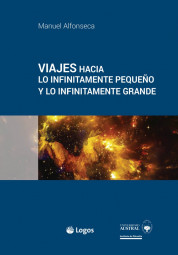 Viajes hacia lo infinitamente pequeño y lo infinitamente grande
Viajes hacia lo infinitamente pequeño y lo infinitamente grandeManuel Alfonseca, Logos - Universidad Austral, 2016.
The worlds of the infinitely small and of the infinitely large, as distant from each other as they are, remain closely connected. Modern Cosmology, which deals with the origin and the end of the universe, cannot be explained without taking particle physics into account.
This book describes a double journey. It begins first from the human size towards the very smallest, crossing the limits of life and ending up in the building blocks of matter. The second part of the journey heads towards the planets, the starts and the galaxies, to reach the end of the universe, its origin and its possible end, as well as the most ardent question in modern physics, which remains unanswered: did anything happen before the Big Bang?
MANUEL ALFONSECA is a Doctor Engineer in Telecommunications and has a degree in Informatics. He worked twentytwo years for IBM, where he was Senior Technical Advisor. He has taught at the Universidad Complutense, at the Universidad Politécnica and the Universidad Autónoma, all in Madrid, where he has also been Ordinary Professor and Head of the Escuela Politécnica Superior. He has published around two hundred technical papers and has also written many popular science articles in La Vanguardia (Barcelona) and in several blogs, such as http://divulciencia.blogspot.com. He has authored more than forty books on informatics, dissemination, historical novels, science fiction, and also for children and teenagers. For this last work he has been awarded the Premio Lazarillo 1988 and the Premio La Brújula de Valores 2012.
Available at Ediciones Logos.
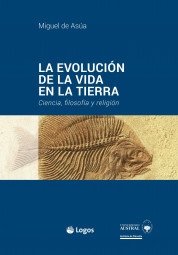 La evolución de la vida en la Tierra. Ciencia, filosofía, religión
La evolución de la vida en la Tierra. Ciencia, filosofía, religiónMiguel de Asúa, Logos - Universidad Austral, 2016.
“La evolución de la vida en la Tierra” has an updated overview of the controversy over evolution in the three major areas of Science, Philosophy and Theology. The analysis, presented in a rigorous way but friendly to the general public, leads the reader through the maze of contemporary evolutionary controversy in what it concerns Christian thought.
In the eyes of the author, Darwin’s theory is a rich stimulus to Christian theology and a test case that, from a philosophical perspective, the thesis of the conflict between science and religion is a false dilemma.
MIGUEL DE ASÚA has a PhD in Medicine (Universidad de Buenos Aires), a Master degree in Theology (Universidad Católica Argentina), a Master degree in History and Philosophy of Science and a PhD in History (University of Notre Dame). He is a Principal Investigator of CONICET and a full member of the National Academy of Sciences of Buenos Aires and the National Academy of History. He teaches at UNSAM (Universidad Nacional de San Martín), UCA and is also a professor of Science and Religion in the Colegio Máximo of San Miguel. Among his numerous publications it stands out “De cara a Darwin. La teoría de la evolución y el cristianismo“. [Looking at Darwin. The theory of evolution and Christianity] (2009).
Available at Ediciones Logos.

